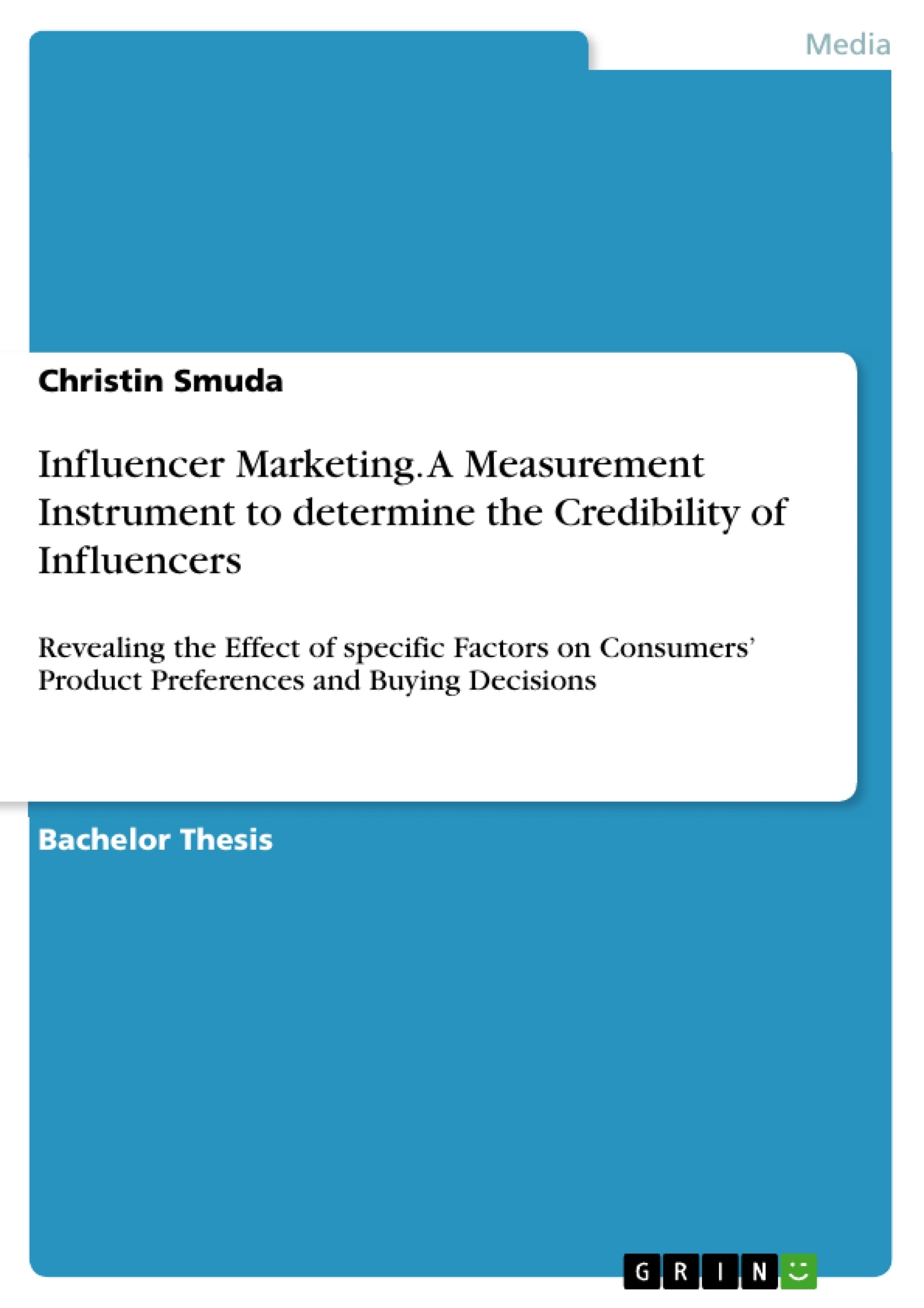The aim of this thesis is to develop a measurement scale to determine the credibility of influencers in today’s digitalized environment. Thus, an extensive literature review will be conducted to reveal underlying dimensions, concepts and impact models of the social construct credibility. Those examinations will provide a well-founded overview of the current academic research in this field and will guide the author to the subsequent empirical investigation. Aligning with the structure of key sources, the researcher decided on a sequential exploratory research design, consisting of a qualitative questionnaire which serves as reliable foundation of the subsequent quantitative questionnaire. Thereby, the qualitative survey aims to define and refine the items of the credibility scale, select exemplary influencers for the following rating process and give the author a first feel about the respondents’ perception of credibility. In contrast, the purpose of the quantitative survey is to collect an extensive amount of data (n=385) to further select descriptor items that consumers associate with credible influencers and therewith, build a reliable and valid base for further analytical calculations.
Inhaltsverzeichnis (Table of Contents)
- Management Summary
- Key Words
- List of Tables and Figures
- Table of Abbreviations
- 1. Introduction
- 1.1 Background and Motivation
- 1.2 Relevance of the Research Topic
- 1.3 Research Question and Objectives
- 1.4 Structure and Research Strategy
- Theoretical Foundation - Current State of Research in the Field of IM as Basis for the Development of a Measurement Scale to determine the Credibility of Influencers
- 2. Influencer Marketing
- 2.1 Definition
- 2.2 Types of Influencers
- 2.3 Impact Models
- 2.3.1 Source-Credibility Model
- 2.3.2 Source-Attractiveness Model
- 2.3.3 Match-Up Hypothesis
- 2.3.4 Meaning-Transfer Model
- 2.4 Legal Regulations concerning Sponsored Content on Social Media
- 2.5 Relationship Management: Grounds for Influencer-Consumer Relationships
- 2.5.1 Network Coproduction Model
- 2.5.2 Mimicry-Social Relationship
- 2.5.3 Trust
- 2.5.3.1 Comparison of Trust Definitions
- 2.5.3.2 Theories of Trust
- 2.5.3.3 Conceptualization and Operationalization
- 2.6 Summary and Consequences for the Research Question
- 2.7 Conceptual Model
- 2.8 Further developed Research Question
- 2. Influencer Marketing
- Empirical Analysis - Conducting Questionnaires sequentially, Constructing the Measurement Scale and Concluding Relations with Depending Variables
- 3. Methodology
- 3.1 Measurement Instrument and its Method
- 3.2 Research Design
- 3.3 Conduction of Questionnaires
- 3.3.1 Pre-Tests
- 3.3.2 Process
- 3.4 Analysis and Results
- 3.4.1 Exploratory Factor Analysis
- 3.4.2 Reliability Analysis
- 3.4.3 Multiple Regression Analysis
- 3.4.4 Summary of the Results and Relevance for the Research Question
- 4. Discussion
- 4.1 Discussion of Results
- 4.2 Limitations
- 4.3 Implications for the Business World
- 3. Methodology
- Bibliography
- Appendix
Zielsetzung und Themenschwerpunkte (Objectives and Key Themes)
This thesis sets out to develop a measurement instrument to determine the credibility of influencers within the contemporary digital landscape. The research will delve into the literature surrounding the social construct of credibility, identifying key dimensions, concepts, and influence models.
- The credibility of influencers in the digital sphere.
- Development of a measurement scale to assess influencer credibility.
- Impact of influencer credibility on consumer product preferences and buying decisions.
- Empirical analysis through sequential questionnaires and statistical analysis.
- Implications for businesses utilizing influencer marketing strategies.
Zusammenfassung der Kapitel (Chapter Summaries)
- Chapter 1: Introduction - This chapter establishes the background and motivation for the research, highlighting the increasing importance of influencer marketing in today's digital world. It introduces the research question and objectives, outlining the scope and methodology of the study. The chapter also details the structure and research strategy employed throughout the thesis.
- Chapter 2: Influencer Marketing - This chapter provides a thorough overview of influencer marketing, defining the concept, exploring various influencer types, and delving into established influence models such as the source-credibility model, source-attractiveness model, match-up hypothesis, and meaning-transfer model. It also examines legal regulations surrounding sponsored content on social media, and the crucial aspect of relationship management between influencers and consumers. Finally, this chapter discusses trust and its relationship to influencer credibility, including various theories and definitions of trust. This chapter concludes with the development of a conceptual model and a refined research question.
- Chapter 3: Methodology - This chapter outlines the methodology employed in developing the measurement instrument, including the chosen research design, the design of questionnaires, and the process of conducting both pre-tests and the main survey. The chapter then explains the data analysis techniques utilized, such as exploratory factor analysis, reliability analysis, and multiple regression analysis, and the role these techniques play in achieving the research objectives.
Schlüsselwörter (Keywords)
The core focus of this thesis centers around the influence of credibility in digital marketing, specifically the impact of influencer credibility on consumer behavior. The research explores the concept of credibility in detail, utilizing established theoretical frameworks and empirical analysis to develop a measurement scale for influencer credibility. This research seeks to contribute to the understanding of consumer response to influencer marketing by examining the relationship between influencer credibility and consumer product preferences and buying decisions. The investigation aims to provide actionable insights for businesses seeking to leverage influencer marketing effectively.
- Quote paper
- Christin Smuda (Author), 2018, Influencer Marketing. A Measurement Instrument to determine the Credibility of Influencers, Munich, GRIN Verlag, https://www.grin.com/document/441996




